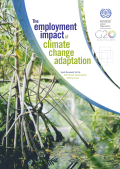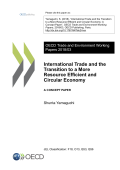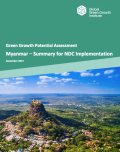
Amsterdam Circular: Evaluation and action perspectives a comprehensive consolidation of insights from the practical implementation of 70+ circular projects in the circular City of Amsterdam and is validated by 100+ local businesses.

This report was prepared by the International Labour Organization (ILO) for the G20 Climate Sustainability Working Group (CSWG) under the Argentina G20 Presidency in 2018. Its shows that adaptation measures to climate change, such as investment in adaptation infrastructure can create jobs and protect workers and income. Social protection, entreprise development and skills policy are necessary to maximise the positive effect of the transition to a climate resilient economy.

International Trade and the Transition to a More Resource Efficient and Circular Economy highlights the potential interaction of international trade and the circular economy in order to map out potential issues to address and to guide further research areas to explore on this topic.
This report, based on research from the Nature Conservancy, the University of Minnesota and 11 other organizations, explores whether it is possible to achieve a future where the needs of both people and nature are advanced. It projects the state of the world in 2050 if development progresses in a “business-as-usual” fashion, and what it would look like if a sustainable path was implemented with a series of fair-minded and technologically viable solutions to the challenges that lie ahead.

An assessment was conducted by the Global Green Growth Institute (GGGI) to identify Myanmar's specific opportunities and barriers in relation to green growth in six sectors. This summary report provides an overview of recommendations relevant for its Nationally Determined Contribution (NDC) implementation, focusing on related recommendations for agriculture, forestry and land use, energy, and education and governance.
